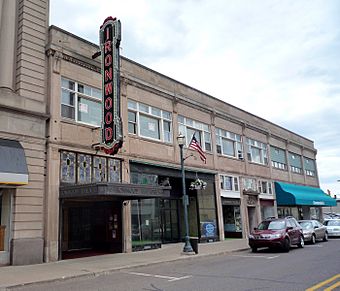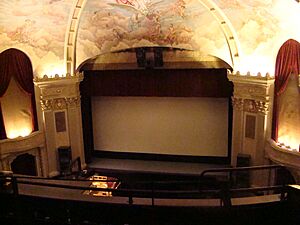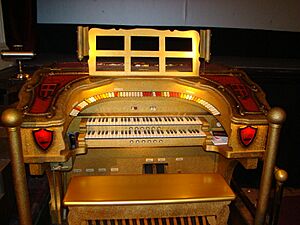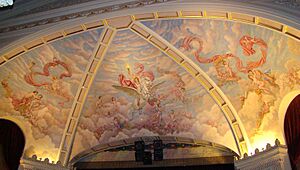Ironwood Theatre facts for kids
Quick facts for kids |
|
|
Ironwood Theatre
|
|
 |
|
| Location | 109 E. Aurora Street Ironwood, Michigan |
|---|---|
| Area | Less than one acre |
| Built | 1928 |
| Architect | Albert Nelson |
| Architectural style | Italian Renaissance |
| NRHP reference No. | 85000061 |
| Added to NRHP | January 11, 1985 |
The Historic Ironwood Theatre is a special place in Ironwood, Michigan, USA. It's a theatre where you can watch many different live shows. These include plays, music concerts, and art performances. The theatre is run by a group of volunteers. They work hard to make sure everyone can enjoy the shows.
Contents
Discovering the Ironwood Theatre's Past
The Ironwood Theatre was built in 1928. Back then, it was one of three movie theaters in Ironwood. It showed brand-new movies and hosted live variety shows called vaudeville. The very first movie shown was Wings from 1927. This film starred famous actors like Clara Bow and Gary Cooper.
The theatre was very popular during the "Golden Age of Hollywood." This was in the 1930s, 40s, and 50s. It continued to show movies and vaudeville acts. However, in the late 1970s, the theatre faced money problems. It had to close its doors in the spring of 1982.
In 1982, the theatre's owner, Thomas Renn, gave it to the City of Ironwood. The theatre reopened in 1988. It became a non-profit group that offers many cultural programs. In 2010, the city bought the building next door. This gave the theatre more space for things like an elevator, new restrooms, and offices.
Theatre Design and Architecture
The Ironwood Theatre was designed by Albert Nelson. He was an architect from Ironwood. It was built in 1928 and cost about $160,000 at that time. Today, that would be like $2 million!
The theatre's style is based on Italian Renaissance design. It has cool fake pillars that look hand-sculpted. The stage has a special arched opening called a proscenium. When it first opened, the theatre could seat 1,000 people. There were 600 seats on the main floor and 400 on the balcony.
Over the years, the theatre has been improved. Some seats were removed to add new features. These include a special area for people using wheelchairs. There is also a booth for lights and sound, and a snack stand. Now, the theatre seats 732 people. The chairs you see today are exact copies of the original ones.
The Amazing Barton Organ
The Barton organ is still in the theatre. It was installed in 1928 and is nicknamed "The Grand Old Lady." This historic theatre organ has two keyboards and 499 pipes. It is still fully playable today!
Work to restore the organ began in 2000. Volunteers learned from experts how to fix it. They checked and cleaned almost every part of the organ. They replaced all the old leather parts. They also replaced many wires to meet safety rules.
After many hours of volunteer work and donations, the organ was fully restored. The main part of the organ, called the console, came back in June 2010. Now, the instrument works perfectly.
The American Theatre Organ Society even wanted to start a local group in Ironwood. This shows how special the Barton organ is.
The Barton Organ Company built about 250 pipe organs. The Ironwood Theatre's Barton organ is one of only about 40 that are still in their original homes. It is also one of only six documented Bartons that can still be played. As of 2010, it was the most recently restored Barton organ.
Exciting Events and Performances
The Ironwood Theatre hosts many different shows. Famous performers like Matt Giraud and Jeff Daniels have been there. Other groups include the Duquesne University Tamburitzans and the Detroit Symphony Orchestra.
The theatre also puts on musicals like South Pacific and Chicago. Many local and regional artists also perform here.
H.I.T. Idol
On November 17, 2011, the theatre held an event called The Historic Ironwood Theatre Presents H.I.T. Idol. It was like the TV show American Idol. Forty-one young singers performed solos. Six winners were chosen to open for Matt Giraud, a finalist from American Idol. All the singers also got to sing backup for two of Giraud's songs. This event showed off local young talent. It was also put together by volunteers from the theatre.
The Beautiful Proscenium Mural
The theatre has a stunning three-piece painting on its proscenium. This is the arch around the stage. Artist William Hasenberg painted it in 1927. It was part of making the theatre look grand.
In 1973, during a renovation, the mural was painted over with dark blue and white paint. People thought the mural was destroyed. But a mural artist named David Strickland was able to remove the paint. He did this without harming the original painting underneath. The mural was fully restored in 1994. Now, it looks just like it did when it was first painted. It truly catches the eye of everyone who enters the auditorium.
 | Selma Burke |
 | Pauline Powell Burns |
 | Frederick J. Brown |
 | Robert Blackburn |




